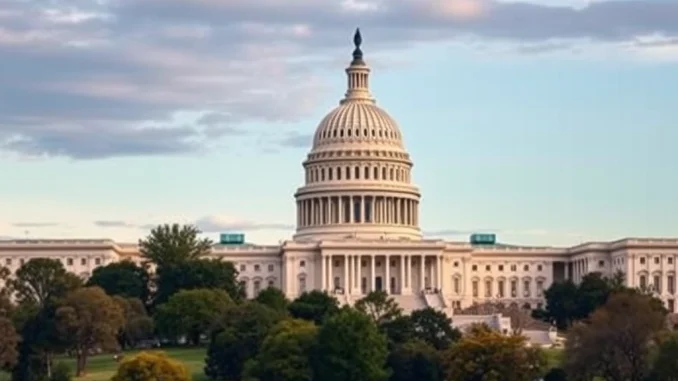
The landscape of US stablecoin regulation is heating up! Crypto enthusiasts and industry participants are closely watching as a significant legislative push is underway in the United States Senate. A key piece of legislation, the Senate stablecoin bill known as the GENIUS Act, is reportedly on track for a potential vote as early as next week.
What is the GENIUS Act? Understanding the Senate Stablecoin Bill
The proposed legislation at the center of this development is officially titled the GENIUS Act. It represents a focused effort by US lawmakers to establish a clear regulatory framework specifically for stablecoins. Stablecoins, cryptocurrencies pegged to a stable asset like the US dollar, have grown significantly in importance within the digital asset ecosystem, acting as a bridge between traditional finance and the volatile crypto market.
This bill aims to bring clarity and stability to the stablecoin sector by introducing specific rules for issuers. According to reports, the GENIUS Act would:
- Establish mandatory licensing requirements for entities issuing stablecoins.
- Require stablecoin issuers to maintain full reserves, ensuring that each stablecoin in circulation is backed one-to-one by equivalent assets.
- Impose clear disclosure obligations on issuers regarding their reserves and operations.
These provisions are designed to protect consumers and ensure the financial stability of stablecoin operations, addressing concerns that regulators have voiced over potential risks in the unregulated space.
Why the Changes? Removing Provisions Targeting Trump Interests
A notable recent development facilitating the bill’s potential movement is the removal of specific language that reportedly targeted the crypto interests of former President Donald Trump and his family. Senator Kirsten Gillibrand, a key figure in this legislative effort, confirmed at a recent Stand With Crypto event that references to Trump-linked ventures have been taken out of the bill text.
These removed provisions reportedly touched upon various aspects of the crypto world, including memecoins, crypto platforms, stablecoins, and mining firms associated with the former president’s family. The decision to remove these specific references appears to be a strategic move aimed at depoliticizing the bill and potentially broadening its bipartisan appeal, clearing a path for a smoother legislative process.
The Path to a Stablecoin Vote: What Happens Next?
With the controversial provisions removed, the focus now shifts to getting the bill through the Senate. Republican Senator Cynthia Lummis, another prominent voice in crypto policy discussions, has indicated that getting the bill passed before Memorial Day (May 26) is a realistic goal. This suggests a strong intent among key senators to move quickly on this legislation.
A Senate stablecoin vote would be a significant milestone, marking the first time a major dedicated crypto regulation bill has advanced this far in the US legislative process. While passage in the Senate would be a crucial step, the bill would still need to pass the House of Representatives and be signed by the President to become law.
Broader Implications for US Crypto Policy
The progress of the GENIUS Act is a strong signal regarding the evolving stance on crypto policy in the United States. For years, the crypto industry has called for regulatory clarity to foster innovation and provide certainty for businesses and investors.
Passing stablecoin legislation could set a precedent and potentially pave the way for further regulatory efforts covering other aspects of the digital asset market. It reflects a growing recognition within Congress of the importance of cryptocurrencies and the need for government oversight to ensure market integrity and consumer protection.
This development highlights the ongoing dialogue between lawmakers, regulators, and the crypto industry as they navigate the complexities of integrating digital assets into the existing financial system.
Conclusion: A Crucial Step for Stablecoin Regulation
The potential upcoming stablecoin vote in the US Senate on the GENIUS Act represents a pivotal moment for US stablecoin regulation. By removing politically charged provisions and focusing on core regulatory requirements like licensing, reserves, and disclosure, the bill appears to have gained momentum. While challenges remain in the broader legislative process, the prospect of a Senate vote next week is a hopeful sign for those seeking clear rules for stablecoins and indicates a maturing conversation around crypto policy in the United States.



